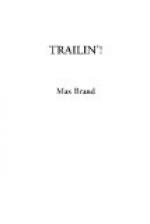So he passed forward like one in a fabric of spider-webs almost fearing to breathe lest the whole house should puff away to shreds before him. Half the boards, fallen from the ceiling, revealed the bare rafters above; below there were ragged holes in the flooring. In one place a limb, torn by lightning or wind from its overhanging tree, had crashed through the corner of the roof and dropped straight through to the ground.
At last he reached a habitable room in the front of the house. It was a new shell built inside the old wreck, with four stout corner-posts supporting cross-beams, which in turn held up the mouldering roof. In the centre was a rude table and on either side a bunk built against the wall. Perhaps this was where Drew lived on the occasions of his visits to the old ranchhouse.
Out of the gloom of the place, Bard stepped with a shrug of the shoulders, like one who shakes off the spell of a nightmare. He strode through the doorway and took the slant, warm sun of the afternoon full in his face.
He found himself in front of the only spot on the entire premises which showed the slightest care, the mound of a grave under the shelter of two trees whose branches were interwoven overhead in a sort of impromptu roof. From the surface of the mound all the weeds and grasses had been carefully cleared away, and around its edge ran a path covered with gravel and sand. It was a wellbeaten path with the mark of heels still comparatively fresh upon it.
The headstone itself bore not a vestige of moss, but time had cracked it diagonally and the chiselled letters were weathered away. He studied it with painful care, poring intently over each faint impression. He who cared for the grave had apparently been troubled only to keep the stone free from dirt—the lettering he must have known by heart. At length Bard made out this inscription:
Here sleeps
Joan
Wife of William drew
She chose this place for rest
CHAPTER X
A BIT OF STALKING
It seemed as if the peaceful afternoons of Logan were ended forever, for the next day the scene of interruption was repeated under almost identical circumstances, save that the tree under which the shepherd sat was a little larger. Larger also was the man who rode over the brow of the hill to the east. The most durable cattle-pony would have staggered under the bulk of that rider, and therefore he rode a great, patient-eyed bay, with shoulders worthy of shoving against a work-collar; but the neck tapered down small behind a short head, and the legs, for all their breadth at shoulder and hip, slipped away to small hoofs, and ankles which sloped sharply to the rear, the sure sign of the fine saddle-horse.
Yet the strong horse was winded by the burden he bore, a mighty figure, deep-chested, amply shouldered, an ideal cavalier for the days when youths rode out in armour-plate to seek adventures and when men of fifty still lifted the lance to run a “friendly” course or two in the lists.




